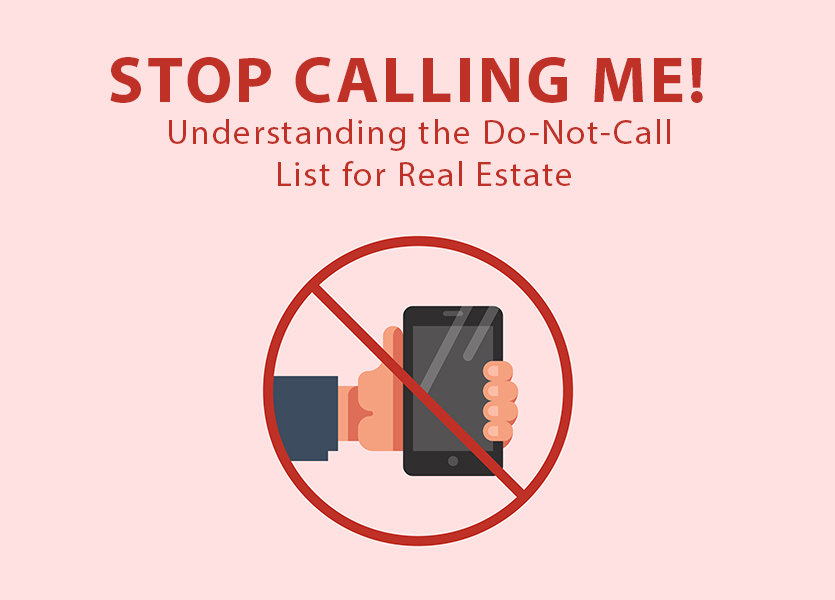You are viewing our site as an Agent, Switch Your View:
Agent | Broker Reset Filters to Default Back to ListStop Calling Me! Understanding the Do-Not-Call List for Real Estate
August 31 2016

We are constantly looking for new ways to prospect in the real estate industry. Social media and digital marketing have taken a spotlight in past years, since they are automated and a more efficient means of attracting future clients. While we may be focused on newer legislation surrounding communication with consumers via email, social media and digital mediums, it's important to remind ourselves of the laws and regulations surrounding more traditional marketing methods, like picking up the phone and calling a prospect.
Beginning in 2005 for the United States and 2008 for Canada, telemarketing businesses have been held to strict guidelines of who they can call and for what purposes. Each country has implemented their own Do Not Call list, managed and regulated by the Federal Trade Commission (FTC) and Canadian Radio-Television and Telecommunications Commission (CRTC), respectively. These laws and regulations are to protect consumers from businesses making calls with the sole purpose of solicitation. Make no mistake—real estate brokerages and professionals are subject to these laws.
We can try to interpret the laws and find loopholes in wording or ambiguous definitions, but the courts have made it clear that the consumer has the right not to be contacted once they register on the Do Not Call List (DNCL). Don't let these rules scare you. They are there to protect you just the same as any consumer, and there is plenty of business to generate using the phone. It takes understanding the rules to get the leg up on your competition:
1. You are not breaking the law by calling a friend or someone you know on a personal level
Even if they are on the Do Not Call List and even if you're calling to solicit business.
2. Businesses cannot register for the Do Not Call list. All B2B marketing is completely acceptable.
People who work from home or for themselves and may use a personal number, mobile or land-line for their business will likely continue to receive calls even if they are registered on the DNCL. This will affect your agents who publish their personal numbers for business use and it will not stop calls coming to your business from B2B telemarketers.
3. You can call consumers on the DNCL list that have given you consent to being called
You can get consent verbally, electronically, or in writing but it must be documented and explicitly outlined that they agree to be contacted "by telephone."
Make sure to use this language on your website registration and contact forms as well as on your open house sign in sheets so you have permission to follow up with these consumers
4. You can call consumers you have an existing or "established" business relationship with or have had a relationship with in the last 18 months
This means calling your past clients, a task often overlooked in this industry, is fair game for 18 months before you need their permission to call them with the purpose of helping them buy or sell a house.
5. You can also call individuals that have made an inquiry to your business – call, email, contact form, etc., for a period of 3 months after the inquiry
All businesses are responsible for maintaining internal Do Not Call lists from consumers that have directly expressed they do not wish to be called by your company, even if one of the exceptions above apply. This is not to be taken lightly. Consumers have the right to tell you not to call them even if they aren't on the national DNCL, and we have a responsibility to ensure this happens.
There is a grey area of whether the brokerage or the agent is responsible if the laws are violated. A brokerage can protect itself under the Safe Harbor provision of the laws by demonstrating they have instituted written procedures, personnel training, recording of calls, as well as regular access to the registry (minimum of every 31 days), and purchasing of the registry lists as part of their routine business practices. There are great guidelines and sample policies written by NAR, CREA and your state, provincial and/or local Realtor® association.
When comparing the Do Not Call List registry fees, offered by area code or national formats, to the fine violations which are up to $16,000 in the US or $15,000 in Canada for businesses and up to $1,500 for individuals for every infraction, it is clear that purchasing the list and maintaining compliance with the laws are the safest and cheapest option for your business.
The phone isn't going anywhere. It will be a part of nearly all real estate business practices for the foreseeable future. While not every consumer will file a complaint if you violate the laws, every time you violate these laws you're not only damaging your reputation, but the industry's reputation as a whole. We need to hold our companies and our agents to the highest standards, and working within these regulations will keep you on track and avoid penalties.
For more information on Do Not Call Lists, visit:
USA:
Canada:
To view the original article, visit the Lone Wolf blog.









